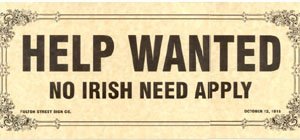Shamrocks and shillelaghs

Tommorrow is a famed day of revelry: drinking of green beer, fighting in the street, public urination, and eventual lack of consciousness (kind of like the Mummer's Parade, less the green beer). I'm not a big fan of St. Patrick's Day. To me, it's amateur night, much like New Year's Eve and the night before Thanksgiving and all the other nearly-mandatory going-out nights we observe throughout the year.
I live in an ethnically Irish neighborhood (though that's changing a bit as time passes) and a large proportion of those are direct-from-the-bog-Irish. Go into any bar along the main road on the way to my house (and there are many), and you'll hear plenty of harmonious Irish accents. But were it not for the huge diaspora from Ireland in the 1840's in the wake of the Potato Famine, my neighborhood would probably be a stronghold of mostly Italians, Poles and Germans.
Growing up Irish, I sort of knew about the Famine, in that I was aware that it had happened. I knew there had been a potato blight, and I knew that a lot of people had died, and a lot of people had emigrated to the states to escape and make a new life. I also knew that many of those people were treated like dirt. But it wasn't until I heard a program about the Famine on NPR about 10 years ago that I knew the real extent of what had happened: the mind-numbing numbers of people who had died, and how little the English government had done for those suffering. This was the first time I had any realization that there might have been, if not a deliberate attempt to starve poor Irish Catholics, then certainly a lackadaisical, uncaring attitude, at best, towards their mass starvation (and active exportation of food from the island that could have been used to feed the starving -- think about that for a second, if you will) that calls to mind the current-day Hurricane Katrina response. You can listen to the program here.
No one knows for certain how many people died. No records were kept, and anyway, the death tolls were so staggering that the clerks wouldn't have been able to keep up.
Thankfully, times have changed, both here and in Ireland (in the Free State, anyway). On Friday, everyone will be a little Irish. Everyone will celebrate and be happy and continue the grand tradition of sharing drinks with friends and talking and laughing through the night. Best wishes to everyone for a Happy St. Patrick's Day - don't forget to wear your green, and don't forget that governmental travesties like the one referenced here are still happening in our own "civilized" country - just like it did in England 160 years ago.



5 Comments:
Word. The Irish were treated like dirt there and here, too. A lot of people forget about that part of Irish history. And SPD is totally amateur night, esp. this year as it falls on a Friday. But have a happy one, regardless, from one Irish girl to another :-)
Have you ever heard Sinead O'Connor's song, Famine? It's about the famed 'famine' and when I read this, I was reminded of that song.
This was a great post. I especially like that I learned a new word: diaspora. Thank you, Mrs. H!
Thanks for a great post. Most Americans like to wear the green and tie one one for St. Patrick's Day, but few, I think, know much about Irish history or what it means to take pride in being Irish. I lift a pint to you, Mrs. H., and the strength and perseverence of your people.
My maternal grandmother was full blooded Irish and her parents came over during the Potato Famine. They settled in Michigan and the family still resides there.
Here's to wearin' o'tha green.
A little bit Irish?
On St. Paddy's Day we are all a 100% Irish. Besides, I married Irish, so it makes me Iish, and you better not diagree with that family. There's too many of them!
Hope you had a great day!
Post a Comment
<< Home